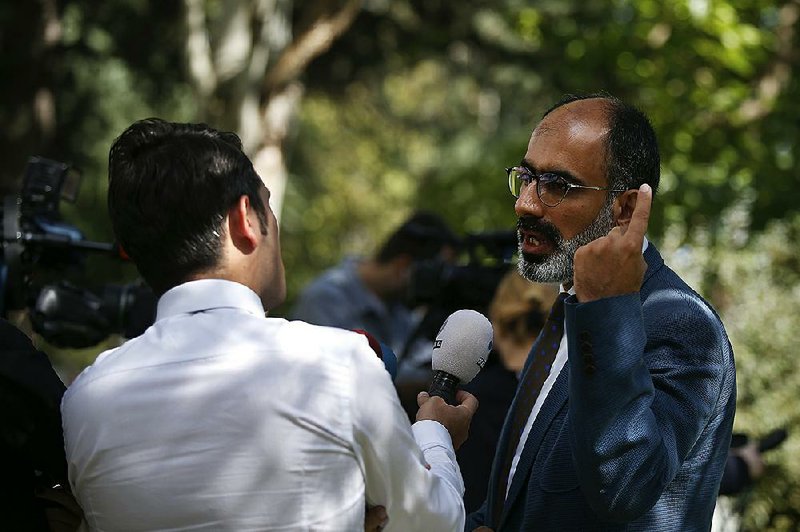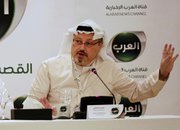ISTANBUL -- President Recep Tayyip Erdogan said on Sunday that he was closely following the investigation into the disappearance of journalist Jamal Khashoggi, calling it "very, very upsetting," but stopped short of confirming reports that he had been killed soon after he entered Saudi Arabia's Consulate in Istanbul last week.
The Washington Post reported Saturday that Turkish investigators had concluded that Khashoggi, who has criticized the Saudi leadership, was killed in the consulate by a team sent from Saudi Arabia in what a person familiar with the probe called a "preplanned murder." Saudi Arabia has denied the accusations and said Khashoggi left the consulate soon after he arrived.
Turkish authorities have said Khashoggi never left the consulate.
Erdogan, speaking to reporters after a speech to his ruling Justice and Development Party in the Turkish capital on Sunday, said, "I am following this issue, chasing it, and whatever the result, we will be the ones to tell the world." Khashoggi "is actually a journalist I have known for a long time, a friend of ours," he added.
"Everything is being inspected, especially entries and exits out of Istanbul, the airport," he said. "Right now we are waiting persistently to see what the prosecutor will decide, what it will announce as a result of these pursuits."
Erdogan promised to follow up personally on the case. "It's very, very sad for us that this happened in our country," the Turkish president said.
"I say, God willing, we will not come face to face with a situation that we do not desire," he said.
Another Turkish official demanded a "convincing explanation" from Saudi Arabia over the alleged killing.
Before Erdogan's speech, a senior Turkish official confirmed that investigators believed Khashoggi was dead. Yasin Aktay, an adviser to Erdogan, told the Reuters news agency that Khashoggi had been killed in the consulate and that a team of 15 Saudi nationals were "most certainly involved." His comments were the first official confirmation that Turkey had concluded the journalist was killed, and they added to the mounting pressure on the Saudi government to explain Khashoggi's fate.
"There is concrete information; it will not remain an unsolved case," Aktay said in an interview with the Turkish CNN network. "The consulate should make a clear explanation," he added, drawing a contrast to a troubled and less-assertive period of Turkey's recent past. "If they consider Turkey as it was like in the 1990s, they are mistaken."
A U.S. official said Turkish government officials have concluded Khashoggi was likely killed inside the consulate by a team that flew in with two private jets. Turkish officials further concluded that his body was probably dismembered, removed in boxes and flown out of the country.
Turkey's Anadolu news agency reported Saturday that the Istanbul public prosecutor's office had opened an investigation into Khashoggi's disappearance.
The growing dispute over his fate threatens relations between Saudi Arabia and Turkey and raises new questions about the kingdom and the actions of its assertive Crown Prince Mohammed bin Salman, about whom Khashoggi wrote critically in his columns.
As a contributor to the Washington Post, Khashoggi has written extensively about Saudi Arabia, including criticizing its war in Yemen, its recent diplomatic dispute with Canada and its arrest of women's rights activists after the lifting of a ban on women driving. All those issues have been viewed as being pushed by Prince Mohammed, who similarly has led roundups of activists, businessmen and others in the kingdom.
The two regional heavyweights and U.S. allies have engaged in a delicate balancing of shared interests and opposing positions, sometimes teaming up to oppose President Bashar Assad in the Syrian conflict, for example, while sparring over Saudi Arabia's campaign to isolate Qatar and its regional fight against political Islam.
FUNERAL PLANS?
Also on Sunday, a friend of Khashoggi said officials told him to "make your funeral preparations," as the Washington Post contributor "was killed" at the Saudi Consulate.
Turan Kislakci, the head of the Turkish-Arab Media Association, spoke to the AP on Sunday outside the Saudi Consulate in Istanbul. He said he believes Turkish officials soon will announce the findings of their investigation.
"What was explained to us is this: He was killed, make your funeral preparations," Kislakci said. "We called a few other places, these are lower officials, but they said: 'We have evidence he was killed in a barbaric way, we will announce it tomorrow or the day after.'"
Kislakci also alleged, based on conversations with officials he did not name, that Khashoggi was made to "faint," then was dismembered.
Rights groups and press freedom advocates have called on the Saudis to immediately account for the whereabouts of Khashoggi, who contributed to The Washington Post's Global Opinions section.
"If true, this would be an abysmal new low. Such an assassination within the grounds of the consulate, which is territory under Saudi Arabian jurisdiction, would amount to an extrajudicial execution," said Lynn Maalouf, Amnesty International's Mideast research director. "This case sends a shockwave among Saudi Arabian human-rights defenders and dissidents everywhere, eroding any notion of seeking safe haven abroad."
The New York-based Committee to Protect Journalists, a press freedom organization, said Saudi authorities "must immediately give a full and credible account of what happened to Khashoggi inside its diplomatic mission."
If confirmed, Khashoggi's murder would "constitute a horrific, utterly deplorable, and absolutely unacceptable assault on press freedom," the Paris-based Reporters Without Borders said on Twitter.
PEN America, which promotes free expression around the world, also called on Saudi authorities to produce Khashoggi immediately if they "wish to counter these claims."
Early Sunday, official Saudi Press Agency released a statement saying that an unidentified official at the Saudi Consulate in Istanbul had dismissed the reports that Khashoggi was killed there.
"The official strongly denounced these baseless allegations, and expressed doubt that they came from Turkish officials that are informed of the investigation or are authorized to comment on the issue," the statement from the Saudi Press Agency said. A "security delegation of Saudi investigators" arrived in Istanbul on Saturday, the statement added, saying they were there to assist in investigating Khashoggi's disappearance.
Khashoggi first visited the consulate on Sept. 28 to obtain a document related to his coming wedding, according to his fiancee and friends. He returned to the consulate Tuesday at about 1:30 p.m., concerned that he might not be allowed to leave, his fiancee, Hatice Cengiz, said.
Khashoggi left his phone with her, along with instructions that she should call Aktay, the Erdogan adviser, if he did not emerge.
After waiting more than four hours, Cengiz called the police, she said.
Information for this article was contributed by Erin Cunningham and Kareem Fahim of The Washington Post; by Mehmet Guzel, Suzan Fraser, Jon Gambrell, Sarah El Deeb and Zeynep Bilginsoy of The Associated Press; and by David D. Kirkpatrick, Ben Hubbard and Carlotta Gall of The New York Times.
A Section on 10/08/2018

